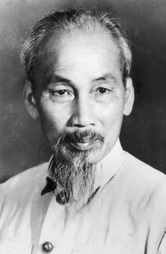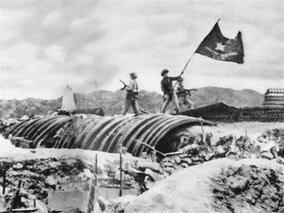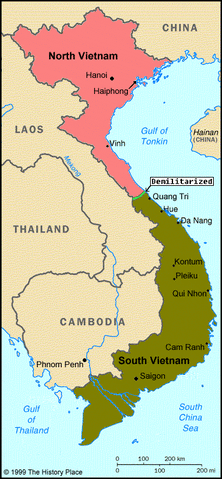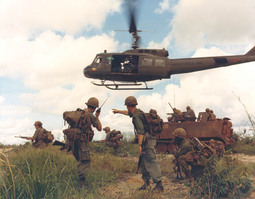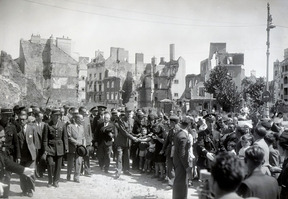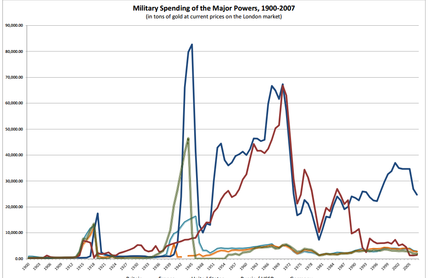Independence of Vietnam
By: Victor Hibbeln
|
Vietnam was a French colony from 1874 to 1954. During World War Two, Japan was able to conquer much of Southeast Asia, thus Vietnam came under joint-colonial rule by Japan and France, with Japan holding more control than France. However, at the end of World War Two in 1945, the Japanese were forced to relinquish control of Vietnam and other occupied lands in Southeast Asia. Thus, this created a power vacuum in Vietnam. The French were slow to respond and due to the infrastructural damage they had sustained in World War Two, it made it difficult for them to mobilize the necessary troops to send over to Vietnam in order to remain in control. Because of this, Ho Chi Minh and the Vietnamese Communist Party were able to take control of Vietnam. When the French finally got troops to Vietnam, they were forced to use violence in an attempt to oust Ho Chi Minh and the VCP from the government.
The first Indochina War began in 1946, with the Viet Minh, Ho Chi Minh’s followers and fighting force, used guerilla warfare against the French troops. Although the French only sustained about a third of the casualties the Viet Minh incurred, the Viet Minh were able to be victorious. The major and final turning point in the first Indochina War came in 1954 at the Siege of Dien Bien Phu. The French wanted to cut off the Viet Minh supply lines in Laos and in turn, draw the Viet Minh into a confrontation with the hopes of crippling them. However, the French were surrounded and the Viet Minh were able rain artillery fire down onto the French, causing a massive amount of French casualties and surrenders after a two month siege. After this decisive defeat of French forces, the French Prime Minister, Pierre Mendes France decided to pull out of Vietnam. This decision can be illustrated in a letter from the French to the United States’ Secretary of State John Dulles. In the letter, the French say, “Bidault closed by saying that for good or evil the fate of Southeast Asia now rested on Dien Bien Phu. He said that Geneva would be won or lost depending on outcome at Dien Bien Phu…” This quote shows that the French realize that if they lose this battle, the Geneva Convention will likely step in and end the war between the French and the Viet Minh. The letter then goes on to say, “He thanked the US for prompt action on airlift for French paratroops.” This illustrates that the French realize that they will be defeated, thus confirming that the French could not sustain a prolonged war due to the effects of the outcomes of World War Two on France. After the French defeat, the Geneva Convention stepped in and in 1954, dissolved the French Indochina colony and divided Vietnam into two independent halves along the 17th parallel. The North became Communist and was supported by the Soviet Union while the South became Democratic and was supported by the United States. The North was ruled by Ho Chi Minh and the South by Ngo Dinh Diem, who lost the support of the United States after his oppressive religious and political policies and was then assassinated during a military coup in 1963. After this, the United States stepped up its military intervention in Vietnam, in order to prevent South Vietnam from falling to the Communists. In 1964, the United States formally committed ground troops in order to aid South Vietnam. The main goal of the United States was to prevent North Vietnam from spreading Communism to the surrounding countries; for fear that once South Vietnam fell, the nations surrounding it would fall to Communism as well. The United States had been involved in the Vietnam War since 1954 by sending military advisors and members of the CIA into Vietnam to support the South Vietnamese in resisting the North. By 1964 though, the United States saw a need to formally send troops into Vietnam because of the coup that ended up killing Diem, since this threw South Vietnam into political chaos and allowed an opening for the Communists to take control of the government. Also, the Gulf of Tonkin incident provided an excuse to commit troops because it showed that the North Vietnamese were becoming increasingly aggressive and needed to be stopped. Nine years after formally committing ground troops to Vietnam, the United States pulled out with the help of the Paris Peace Agreement of 1973. However, the North did not abide by the agreement and invaded South Vietnam, ultimately defeating them in 1975. When the Vietnam War ended, the country was unified and the Vietnamese Communist Party took control of the government. While in control of the government, they cracked down on capitalistic practices and took state control of factories and farms, thus causing an economic collapse and inflation in the 1980s. Also, many of the South Vietnamese were unwillingly to become Communist and were sent to labor camps or executed. However, in 1986, the Sixth National Congress decided to privatize farms and factories while promoting foreign investment and deregulating the economy. This led to massive economic growth in a short period of time for Vietnam. Over time, the economic policies of Vietnam have become increasingly capitalist. When looking at the Vietnam independence movement, it is clear that it had global repercussions. Since France was ravaged by two world wars in 50 years, their infrastructure and economy was severely weakened. With a weakened economy came a smaller military since the government was putting its available funds towards rebuilding the economy and infrastructure of France. The picture to the right proves that France was badly damaged and needed a lot of time and money to rebuild its infrastructure, thus taking money away from the conflict in Vietnam. This downsized military meant that it was harder for France to effectively control their colonies since they had a small military force. Looking at the graph on the right, it can be seen that the French(orange) military spending decreased in approximately 1946, a year after World War 2 had ended. Also, the British(blue) military spending dropped as well, thus showing that not only was the military presence of France declining, but Britain's was also decreasing as well since they were spending less on their military in order to rebuild their countries. Even though France's spending increased a little 1951 due to Vietnam, it never returned to its peak, thus showing that France's military presence had declined. Overall, Europe's influence around the world drastically decreased because of the damage they had been dealt in the two world wars. This decrease in European influence was important because it marked the end of European colonialism around the world, thus spurring independence movements like Vietnam's. In fact, the whole of Europe had badly damaged infrastructures and economies, thus pulling the world economy as a whole down. It was not until the Marshall Plan the European economies rebounded. Even with the Marshall Plan, the French were wary to be dragged into yet another war after sustaining heavy casualties in the two world wars. For the French, they over extended their already depressed economy by trying to hang on to Vietnam. Also, by the 1950s, colonialism had begun to drop out of favor because it was no longer seen as being necessary to the host country’s economy. After World War Two the economies of European nations were able to sustain themselves and effectively get their needed resources legitimately, thus they no longer needed to exploit other countries through colonization for them. Ultimately, these things caused the United States to become involved in Vietnam because France could not keep its grip on it for the aforementioned reasons. Thus, it is clear that the independence movements, specifically in Vietnam, had global repercussions. |
|
